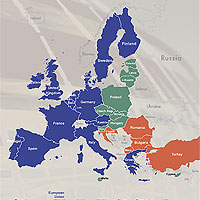Tensions to linger in Russia-EU relations in foreseeable future – Russian experts

(Interfax – MOSCOW, June 4, 2013) “Serious progress” in Russia-EU political rapprochement will hardly be made in the near future, experts stated in a report, “Russia-EU. Partnership Possibilities”, published on Monday.
“We see no real reasons for serious progress in Russia-EU political rapprochement in the short-term prospect,” says the report written under the aegis of the Russian International Affairs Council (RIAC).
“There are all grounds to believe that general tensions will remain in the relations between Russia and the European Union in the foreseeable future,” the experts supposed. “Politicians of both sides do not expect big gains from the search for compromises at present. On the contrary, they can rely on the remaining tensions as a mechanism for achieving internal concord (inside Russia and the EU) in possible transformations of their political systems.”
“Both Russia and the European Union are using the Russian foreign policy for the purpose of their internal consolidation,” the experts said.
“From the point of view of further development of Russia-EU relations it is significant and regretful that the domestic political rhetoric and “adamant policy” in relationships on the post-Soviet space make Russia a real candidate for being a common threat consolidating EU members,” the experts argued.
“The main challenge in the common area of external security is the elaboration of unified approaches to the settlement of conflicts in the “neighborhood” space,” the report said.
The experts also think that “a general improvement of relations, primarily, bigger confidence in Russia,” will assist in further relaxation of the visa regime with the European Union.
“Pressure on EU states and retaliation against countries which set stricter visa criteria” would be unpromising, they said.
The experts suggested as “a medium-term objective the work on broadening Russian exports through the development of modern processing industries and incorporation into the international industrial production chains.”
“A long-term task is the establishment of Russian-European transnational corporations, which would be competitive on the global market and rely on the aggregate domestic demand of the markets of the European Union, Russia and CIS member states,” the report said.
As to the energy dialogue, they propose diversification of relations “to promote de-politicization, understanding of the cooperation goal and formation of a legal framework.”
The experts also think “there should be no hurry in adding energy provisions to the new fundamental agreement between Russia and the European Union as the goal is rather amorphous.”
A Russia-EU summit will take place in Yekaterinburg on June 3-4.
